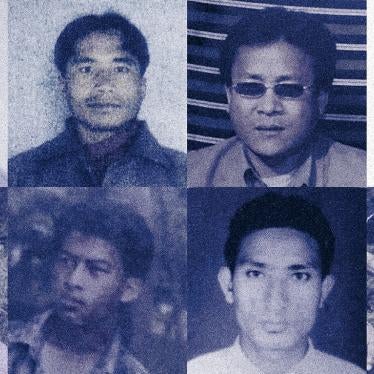The Obama administration has made curbing nicotine use by kids a public health priority, with efforts including mass media campaigns to reduce teen smoking and a proposed ban on selling e-cigarettes to minors. But when it comes to the serious health risks run by thousands of children who work each summer on tobacco farms in the United States, the administration has been conspicuously silent.
Lax federal labor laws allow kids as young as 12 to work in tobacco fields, despite mounting evidence that they can contract acute nicotine poisoning from handling tobacco leaves. Even some tobacco growers and companies take the position that U.S. laws and regulations aren’t strong enough. But the Obama administration has said little and done even less. That needs to change.
A Human Rights Watch report released in May documented the dangers to children working on American tobacco farms based on a year’s research and interviews with 141 child tobacco workers, ages 7 to 17, in the country’s four largest tobacco-producing states: North Carolina, Kentucky, Tennessee and Virginia. Tobacco grown in these fields is used to produce popular cigarette brands, including Marlboro, Pall Mall and Newport. Nearly three-quarters of children interviewed reported feeling sick—with nausea, vomiting, headaches, dizziness, difficulty breathing, or other serious symptoms while working in tobacco fields. Many of these symptoms are consistent with acute nicotine poisoning, also known as Green Tobacco Sickness. A 2007 Journal of Public Health review of public health studies found that non-smoking tobacco workers have as much nicotine in their bodies as active smokers.
Most of the children we spoke to labored for 50 to 60 hours a week in sweltering heat, often without shade or adequate drinking water. They plant seedlings, weed tobacco fields and work among tall tobacco plants, breaking flowers off the top of the plants and removing leaves called “suckers” that reduce the yield and quality of the tobacco. In Kentucky, Tennessee and Virginia, children often hand-harvest tobacco plants by cutting them with small axes and spearing the stalks onto long sticks with pointed ends. Some climb high into the rafters of curing barns to hang heavy sticks of tobacco to dry. Many children described how pesticides—known neurotoxins that can cause long-term and chronic health problems—drifted over them as tractors sprayed in the fields where they worked, causing their eyes and skin to itch and burn.
Double standards in U.S. labor law allow children to work at younger ages, for longer hours and under more hazardous conditions in agriculture than in any other industry. It’s perfectly legal for a 12-year-old to work 50 or 60 hours a week in tobacco fields, as long his or her parents’ consent and the work doesn’t directly conflict with school hours. Moreover, there are no special provisions in U.S. laws or regulations to account for the unique hazards of tobacco work, despite evidence that exposure to nicotine might be especially harmful to children, whose brains and bodies are still developing.
Three years ago, the U.S. Department of Labor proposed a draft regulation that included working in tobacco among the hazardous tasks prohibited for children under age 16. But the administration later withdrew the regulation after intense lobbying by agricultural interest groups. The administration has been virtually silent on the subject ever since.
Even some in the tobacco industry have been more proactive than the Obama administration, in response to reports on the risks to child tobacco workers. In July, the Kentucky-based Council on Burley Tobacco, which represents 5,000 tobacco growers in four states, adopted a new policy stating that it “does not condone the hiring of anyone under the age of 16 for work in tobacco anywhere in the world.”
A spokesperson for Philip Morris International, a leading tobacco company, was quoted in a front-page story in last Sunday’s New York Times saying that the company would welcome a strengthening of the U.S. regulatory framework regarding children working in tobacco. Under its own labor policies, Philip Morris already bars children under age 18 from performing the most hazardous tasks in tobacco farming.
Most other top tobacco companies have much weaker child labor policies, and some, including Reynolds American, the second-largest tobacco company in the United States (and home of Joe Camel), have none at all.
Members of Congress have begun to respond. In May, 17 senators wrote to the world’s 10 largest tobacco companies, urging stronger child labor policies, while Rep. David Cicilline (D-R.I.) introduced legislation in July to prohibit tobacco work by children. Cicilline and Rep. Matt Cartwright (D-Penn.) are currently collecting signatures from other members of the House on a letter to Labor Secretary Thomas E. Perez, urging a new rule narrowly tailored to keep kids out of tobacco fields.
The Obama administration’s inaction is perplexing. While it will fall to Congress to update hopelessly out-of-date U.S. child labor laws relating to agriculture, the administration could go a long way, right now, toward addressing the risks to children by proposing a new federal rule to prohibit children under age 18 from working in the cultivation or curing of tobacco.
For years, the government has restricted how cigarette companies can market and sell their products, with the interests of children and adolescents in mind. But if it doesn’t act soon on tobacco farming, the Obama administration will make even the tobacco industry look like a leader on child safety.







